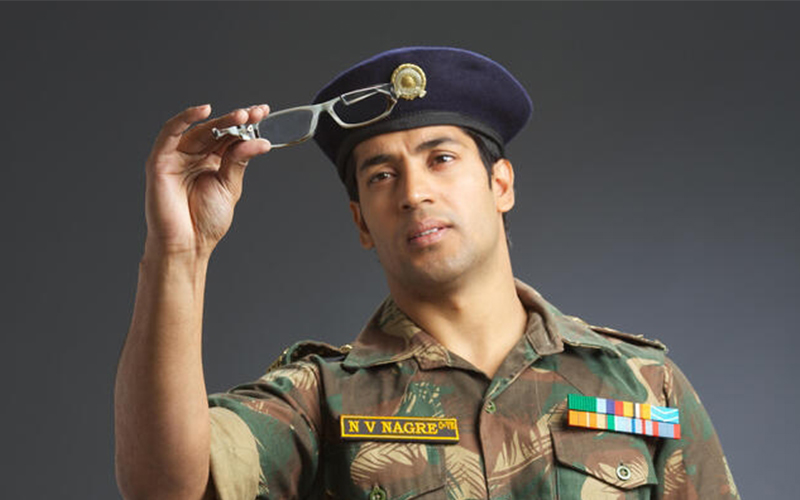
Can you wear glasses, contact lenses or sunglasses in the military? This might be questions bothering people who are preparing for military service, while they are myopic, will this be a problem to get in the army? In this article I will tell you if you can join the military if you wear optical frame eyeglasses, and what are the army glasses regulations.

Can You Wear Glasses in the Military?
Can i join the military if i wear glasses? Yes, it’s indeed, individuals requiring corrective eyewear, including glasses, are eligible to enlist. Upon induction, recruits necessitating glasses will typically receive two pairs during basic training (or its equivalent) and are required to wear them throughout this initial phase and subsequent training, such as AIT or OCS. After assignment to their respective units, individuals may opt to use contact lenses. It is important to note that while wearing glasses does not inherently impede one’s military career, it might render individuals ineligible for certain Military Occupational Specialties (MOS) as per anecdotal information.
Can You Wear Contacts in the Military?
The simply answer is YES, in the military, wearing contacts is generally allowed, but specific functions within armed services may have prohibitions against them. For example, Air Force aircrew members typically cannot wear contact lenses unless it’s medically necessary. Furthermore, guidelines regarding contact lenses’ appearance vary across branches for service members in uniform. The U.S. Army and Air Force strictly prohibit tinted or colored contacts. Conversely, the Navy or Marines permit natural-colored contacts like brown, blue, or green while in uniform.
Do You Have to Get Used to New Glasses?
Yes. Typically, it requires around two to three days for individuals to acclimate to a new prescription, although some may encounter eye strain and visual distortion for a period extending up to two weeks. This adjustment phase is a common occurrence since both your eyes and brain need time to familiarize themselves with processing visual information through a different lens. Whether it’s been a considerable duration since your prescription was updated or if this marks your initial experience with glasses, allowing your brain a day or two to acknowledge the clear, fresh visual input is crucial. Your brain has been compensating for impaired vision for an extended period, considering it as the “normal” state. However, it will gradually adapt to the new visual standard provided by your fresh eyewear.
Army Glasses Regulation
Poor vision typically doesn’t limit your ability to serve in the U.S. Military, it is allowed that your vision problem can be suitably corrected with eyeglasses, contact lenses or vision correction surgery, according to ar670-the USA official statement, the following arethe army glasses reglations:
Restrictions on Eyeglasses:
- Conservative civilian prescription eyeglasses are permitted with all uniforms, ensuring a professional appearance is maintained.
- Restrictions on eyeglasses include prohibiting trendy or adorned frames, lenses with extreme or vibrant colors, or frames that are excessively large or small. Soldiers are not allowed to attach chains, bands, or ribbons to eyeglasses, and eyeglass restraints are only allowed for safety reasons. Hanging eyeglasses or their cases on the uniform or letting glasses hang from restraints in front of the uniform is not permitted.
Restrictions on Sunglasses:
Conservative prescription and nonprescription sunglasses are authorized for wear in a garrison environment, except during formation and indoors. Exceptions are granted for medical reasons necessitating sunglasses, except in situations affecting health or safety. Sunglasses are prohibited in the field unless specifically required by the commander for safety in high-glare environments.

Restrictions on Contact Lenses:
Tinted or colored contact lenses are strictly prohibited while in uniform. The sole exception is opaque lenses prescribed for medical reasons related to eye injuries. Additionally, clear lenses that alter the appearance of the iris are not allowed for wear with the uniform.
What Are the Best Military Used Glasses?
Protective eyewear meeting stringent criteria and undergoing rigorous testing is imperative to ensure its efficacy in combat situations. The U.S. military, known for its strict gear regulations, maintains uncompromising guidelines for ballistic eyewear. Specifically engineered to shield against projectiles that pose threats to the eyes during military operations or training, such as high-speed debris like chips, sand, or dirt, ballistic eyewear becomes crucial for optimal protection. The stringent U.S. military ballistic fragmentation standards guarantee that eye protection is equipped to meet the demanding conditions of combat. Eyewear classified as military rated assures 5-7 times greater ballistic fragmentation defense compared to standard Z87-approved safety glasses, highlighting the significant disparities between these two safety standards.
Looking for great metal optical frames at here!
Conclusion
In conclusion, to the question that can you wear glasses in the military, it’s definitely yes. Wearing glasses, contact lenses, or sunglasses generally does not preclude individuals from joining the military, provided that proper regulations are followed. The U.S. Military accommodates vision correction needs through eyeglasses, contacts, or corrective surgery, with each branch having specific guidelines. While the military allows the use of conservative eyeglasses and certain types of sunglasses in appropriate settings, there are strict regulations regarding their appearance and usage. Contact lenses, too, come with limitations, especially concerning colored or tinted varieties, except for specific medical reasons. Moreover, the military emphasizes the necessity of high-quality protective eyewear meeting stringent ballistic standards to ensure optimal eye protection in combat situations, emphasizing the critical role of specialized eyewear in safeguarding against potential threats.
Q&A
Why Are Shooting Glasses Tinted Yellow?
Yellow-tinted shooting glasses feature a protective yellow coating on the lenses, specifically designed to neutralize the blue light emitted by fog and sunlight. Users within the firearms community, including professionals, hunters, and military personnel, commonly advocate for the yellow filter’s ability to enhance depth perception. This tint is believed to bolster accuracy when using firearms and decrease the likelihood of missing a target. By amplifying contrast and visual sharpness, these glasses contribute to improved reaction times and better differentiation of targets, ultimately aiding in overall shooting performance.
Do Soldiers Wear Glasses in Combat?
Yes, it is needed for soldiers wear glasses in combat. The necessity for eye protection is crucial for individuals utilizing firearms, regardless of whether they are in a shooting range, forest, or open field. Numerous shooting scenarios occur outdoors, exposing soldiers to elements like wind, sun, and dust, which can potentially cause eye-related issues and affect vision.
Why Do Soldiers Wear Sunglasses?
Shooters wear sunglasses not only for protection, but also to see better. Sometimes objects can be washed out in sun glare. Details are more visible when sunglasses are donned. Depending on the conditions, sunglasses can make a soldier a better operator when operating in the elements.
what sunglasses does the military use?
Military always wear ballistic eyewear, in Impact Resistant Frames and Lenses. This choice serves to safeguard soldiers’ faces from potential blowback caused by firearms. Blowback, or recoil, refers to a mechanism in self-loading firearms where energy is derived from the motion of the cartridge case propelled backward by expanding gas created upon ignition of the propellant charge.




